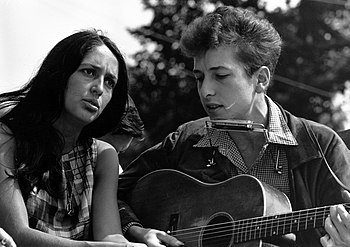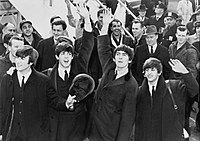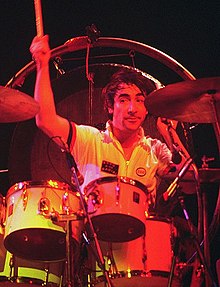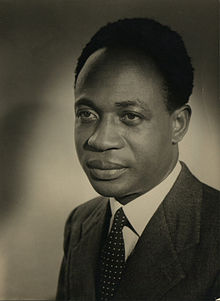The 1960s Portal
The 1960s became synonymous with the new, radical, and subversive events and trends of the period. In Africa the 1960s was a period of radical political change as 32 countries gained independence from their European colonial rulers. Some commentators have seen in this era a classical Jungian nightmare cycle, where a rigid culture, unable to contain the demands for greater individual freedom, broke free of the social constraints of the previous age through extreme deviation from the norm. Christopher Booker charts the rise, success, fall/nightmare and explosion in the London scene of the 1960s. However, this alone does not explain the mass nature of the phenomenon. Several nations such as the U.S., France, Germany and Britain turned to the left in the early and mid 1960s. In the United States, John F. Kennedy, a Keynesian and staunch anti-communist, pushed for social reforms. His assassination in 1963 was a stunning shock. Liberal reforms were finally passed under Lyndon B. Johnson including civil rights for African Americans and healthcare for the elderly and the poor. Despite his large-scale Great Society programs, Johnson was increasingly reviled by the New Left at home and abroad. The heavy-handed American role in the Vietnam War outraged student protestors across the globe, as they found peasant rebellion typified by Ho Chi Minh and Che Guevara more appealing. Italy formed its first left-of-center government in March 1962 with a coalition of Christian Democrats, Social Democrats, and moderate Republicans. Socialists joined the ruling block in December 1963. In Britain, the Labour Party gained power in 1964. In Brazil, João Goulart became president after Jânio Quadros resigned. This is a Featured article, which represents some of the best content on English Wikipedia..
The Coinage Act of 1965, Pub. L. 89–81, 79 Stat. 254, enacted July 23, 1965, eliminated silver from the circulating United States dime (ten-cent piece) and quarter dollar coins. It also reduced the silver content of the half dollar from 90 percent to 40 percent; silver in the half dollar was subsequently eliminated by a 1970 law. There had been coin shortages beginning in 1959, and the United States Bureau of the Mint expanded production to try to meet demand. The early 1960s was a time of increased use of silver both in the coinage and in industry, putting pressure on the price of silver, which was capped at just over $1.29 per ounce by government sales at that price. The silver in a dollar's worth of quarters would be worth more as bullion than as money if the price of the metal rose past $1.38 per ounce, and there was widespread hoarding of silver coins. Demand for the Kennedy half dollar as a collectable drove it from circulation after its debut in 1964. The Bureau of the Mint increased production, helping reduce the coin shortages by May 1965, but government stocks of silver were being rapidly reduced, and threatened to run out by 1968. After extensive study by the Treasury Department, President Lyndon B. Johnson in June 1965 recommended that Congress pass legislation to allow for silverless dimes and quarters, and debased silver half dollars. Although there was some opposition, mainly from legislators representing Western mining states, the bill progressed rapidly through Congress, and was enacted with Johnson's signature on July 23, 1965. (Full article...)This is a Good article, an article that meets a core set of high editorial standards.
American Airlines Flight 1 was a regularly scheduled passenger flight from New York International (Idlewild) Airport (now John F. Kennedy International Airport) in New York City to Los Angeles International Airport in Los Angeles. During the March 1, 1962, operation of the flight, the Boeing 707 executing it rolled over and crashed into Jamaica Bay in New York City two minutes after taking off, killing all 87 passengers and eight crew members aboard. A Civil Aeronautics Board investigation determined that a manufacturing defect in the autopilot system led to an uncommanded rudder control system input, causing the accident. A number of notable people died in the crash. It was the fifth fatal Boeing 707 accident, and at the time, the deadliest. It was third of three fatal crashes during an operation of American Airlines Flight 1. Finally, this was the third fatal crash involving one of American's 707s in the New York area within a three-year period, after Flight 514 and Flight 1502. (Full article...) Selected picture - American folk singers Joan Baez and Bob Dylan, performing a duet at the March on Washington for Jobs and Freedom on August 28, 1963. Both were relatively new recording artists at the time, with Baez being at the forefront of American roots revival and Dylan having just released his second album. Baez was especially influential in introducing audiences to Dylan's music by recording several of his early songs and inviting him onstage during her own concerts.
Did you know -
Related portalsThis is a Featured article, which represents some of the best content on English Wikipedia..
Sir Richard Starkey MBE (born 7 July 1940), known professionally as Ringo Starr, is an English musician, songwriter and actor who achieved international fame as the drummer for the Beatles. Starr occasionally sang lead vocals with the group, usually for one song on each album, including "Yellow Submarine" and "With a Little Help from My Friends". He also wrote and sang the Beatles songs "Don't Pass Me By" and "Octopus's Garden", and is credited as a co-writer of four others. Starr was afflicted by life-threatening illnesses during childhood, with periods of prolonged hospitalisation. He briefly held a position with British Rail before securing an apprenticeship as a machinist at a Liverpool school equipment manufacturer. Soon afterwards, Starr became interested in the UK skiffle craze and developed a fervent admiration for the genre. In 1957, he co-founded his first band, the Eddie Clayton Skiffle Group, which earned several prestigious local bookings before the fad succumbed to American rock and roll around early 1958. When the Beatles formed in 1960, Starr was a member of another Liverpool group, Rory Storm and the Hurricanes. After achieving moderate success in the UK and Hamburg, he quit the Hurricanes when he was asked to join the Beatles in August 1962, replacing Pete Best. (Full article...)This is a Good article, an article that meets a core set of high editorial standards.
Keith John Moon (23 August 1946 – 7 September 1978) was an English musician who was the drummer for the rock band the Who. Regarded as one of the greatest drummers in the history of rock music, he was noted for his unique style of playing and his eccentric, often self-destructive behaviour. Moon grew up in Wembley and took up the drums during the early 1960s. After playing with a local band, the Beachcombers, he joined the Who in 1964 before they recorded their first single. Moon was recognised for his drumming style, which emphasised tom-toms, cymbal crashes, and drum fills. Throughout his tenure with the Who, his drum kit steadily grew in size, and (along with Ginger Baker) he has been credited as one of the earliest rock drummers to regularly employ double bass drums in his setup. Moon occasionally collaborated with other musicians and later appeared in films, but considered playing in the Who his primary occupation, and remained a member of the band until his death. In addition to his talent as a drummer, Moon developed a reputation for smashing his kit on stage and destroying hotel rooms on tour. He was fascinated with blowing up toilets with cherry bombs or dynamite, and destroying television sets. Moon also enjoyed touring and socialising, and became bored and restless when the Who were inactive. His 21st birthday party in Flint, Michigan, has been cited as a notorious example of decadent behaviour by rock groups. (Full article...)Selected article -Francis Kwame Nkrumah (21 September 1909 – 27 April 1972) was a Ghanaian politician, political theorist, and revolutionary. He served as Prime Minister of the Gold Coast from 1952 until 1957, when it gained independence from Britain. He was then the first Prime Minister and then the President of Ghana, from 1957 until 1966. An influential advocate of Pan-Africanism, Nkrumah was a founding member of the Organization of African Unity and winner of the Lenin Peace Prize from the Soviet Union in 1962. After twelve years abroad pursuing higher education, developing his political philosophy, and organizing with other diasporic pan-Africanists, Nkrumah returned to the Gold Coast to begin his political career as an advocate of national independence. He formed the Convention People's Party, which achieved rapid success through its unprecedented appeal to the common voter. He became Prime Minister in 1952 and retained the position when Ghana declared independence from Britain in 1957. In 1960, Ghanaians approved a new constitution and elected Nkrumah President. (Full article...)More Did you know (auto generated)
TopicsCategoriesWikiProjects
Associated WikimediaThe following Wikimedia Foundation sister projects provide more on this subject:
Discover Wikipedia using portals |





























